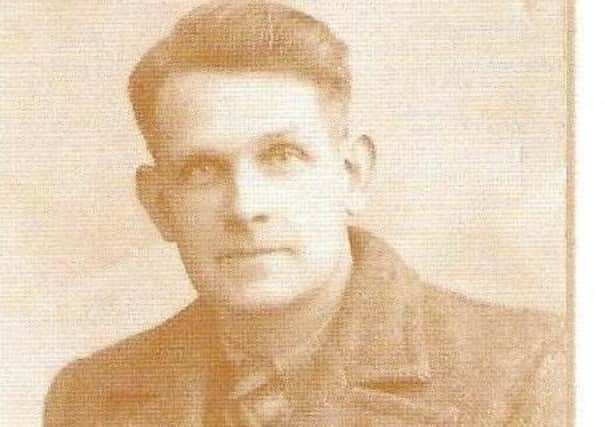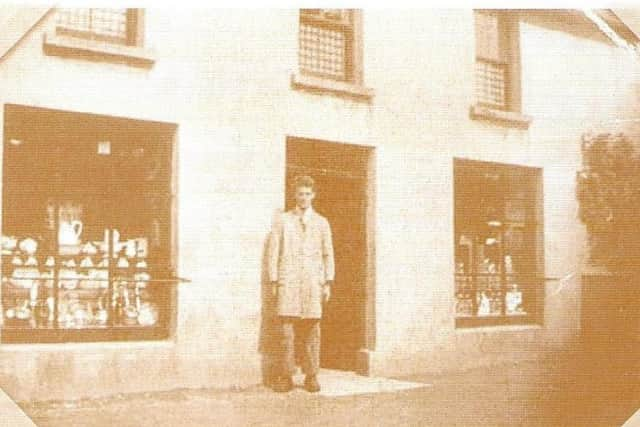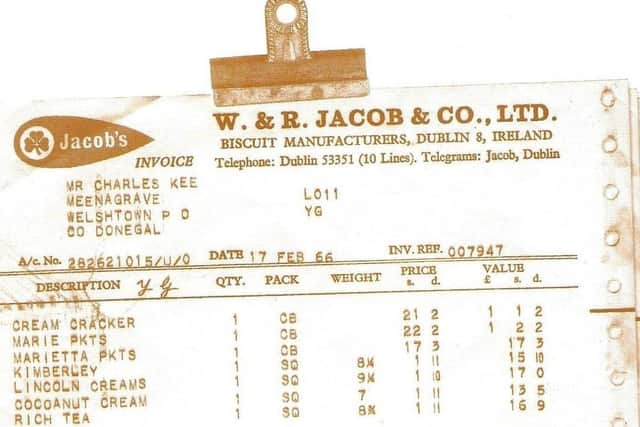All change tomorrow but how did everyone trade in days of yore?


There was quite a variety of stories on last Wednesday’s page with yet more coming on Friday, but today there’s just one!
Providing everything goes according to plan, most of the Brexit deal’s Free Trade Agreement comes into force at 11pm tomorrow night, so today’s page focuses on some wonderfully evocative memories of trading in times past - in a little country shop, in Donegal.
Advertisement
Hide AdAdvertisement
Hide AdEarly in February, Pearl Hutchinson from Kilrea shared some stories here from her book ‘Behind the Wooden Counter’. Her vivid descriptions, along with old sepia photographs, told of her 1950’s childhood in her dad’s shop in in Donegal.


The book has raised thousands of pounds for heart surgery for a little girl in the Philippines, and Pearl says that her life-long love of writing and telling stories grew from “helping to attend customers in the shop”!
Her father, Charles Kee (‘Charlie the Shop’) owned the country business beside their home in Finn Valley, County Donegal - five miles from Ballybofey and Stranorlar.
Pearl’s great uncle, Thomas (Tom) Kee, built the shop around 1890, aided by his brother Charles, with stones “they carted from the hill. Old ladies in black shawls came with their baskets tucked under their arms, on a horse and trap, or in a cart, though most walked.”
Advertisement
Hide AdAdvertisement
Hide AdThere was a wooden bench in the shop “where they could rest their weary legs. Old and young liked to sit there while they were being served.”


They chatted and joked and sometimes argued.
“If a row broke out Tom would chase the offenders up the road with a shovel!”
Pearl’s dad took over the business in 1942 and his brother Jimmy helped serve customers.
There was no fridge or a freezer and the goods were laid out on the wooden counter for totting up. Nothing was pre-packaged.
Advertisement
Hide AdAdvertisement
Hide AdEverything was weighed, paper-bagged and “tied with a cord which hung from the ceiling over the counter.”
Pearl’s book lovingly reproduces old bills, shopping lists, sales dockets, receipts and invoices.
“Tea, sugar and butter were nearly always the top items,” she remembers.
On February 12, 1945, Charles Kee married Jennie McClean, a young waitress in a Stranorlar hotel.
Advertisement
Hide AdAdvertisement
Hide Ad“It was the beginning of a long and happy marriage that lasted for over 50 years” Pearl reflects in the book, which has a chapter entitled ‘The Sweetie Jars’, a feature of the shop that was greatly appreciated by herself, her siblings Dorothy and Charles Junior and just about all of the children in the neighbourhood!
Her father’s lengthy confectionery orders from a Letterkenny wholesaler rekindle very sweet (and cheap!) memories - 4lbs of Orange Chocolate at only 9d (old pennies) for a quarter pound, Crystal Fruits and Mixed Gooseberries at 7d and Dairy Mixture and Chocolate Saltines at 8d each for a quarter.
The ‘old favourites’ on Mr Kee’s 1965 confectionery order are wrapped with nostalgia in Pearl’s book - Brandy Balls, Barley Sugar, Black Striped Balls, Toffee and Liquorice. (Roamer wonders if any of those are mentioned anywhere in tomorrow night’s Free Trade Agreement!)
“In the centre of the back wall, behind the wooden counter,” Pearl recounts “there were two shelves lined with shiny glass jars. The bright coloured sweets were there to tempt the customer.
Advertisement
Hide AdAdvertisement
Hide AdIn earlier times a poke of sweets was a real luxury - ten toffees for 1d.”
Charles often showed his young family how to make a poke. “It was more difficult than it looked,” Pearl admits retrospectively, sharing a photo of an actual poke that she has kept and cherished “that my father made for me years ago.” Boiled sweets were immensely popular, but problematic!
“As the boiled sweets were not individually wrapped,” Pearl explains “they tended to stick together at the bottom of the sweetie jar.”
Her cousin Valerie was a regular visitor to the Kee’s, and no wonder!
Advertisement
Hide AdAdvertisement
Hide Ad“Valerie remembers having to pour hot water over the boiled sweets to release them from the jar. They couldn’t be sold, but they could be eaten by little cousins!”
Biscuits were popular too “a luxury stored in large biscuit tins”, and like the sweets, their names bring back memories of munching from days of yore - fig rolls, Lincoln creams, Kimberly, custard and coconut creams. Along with boiled sweets, loose biscuits had a drawback!
“When handled a lot they were inclined to break,” Pearl recalls, and adds, “This was a great delight to schoolchildren who could sometimes afford a bag of broken biscuits.
What a treat on the way home from school!” (And doubtlessly prohibited in tomorrow night’s Free Trade Agreement!)
Advertisement
Hide AdAdvertisement
Hide AdHer dad’s shop stocked most of the everyday requirements for country living - for cooking, cleaning, washing, knitting and sewing.
There was everything behind his wooden counter for keeping families fed, oil lamps burning, gardens growing, feet shod, heeled and booted, doors hinged and coughs cured.
And as well as the delectable range of biscuits, cakes and confectionery, there were plenty of items on offer to help work off those extra inches - a wide choice of spades, hedge cutters, wheelbarrows and manure forks!
For a copy of Pearl Hutchinson’s book, e-mail the author at [email protected]
Comment Guidelines
National World encourages reader discussion on our stories. User feedback, insights and back-and-forth exchanges add a rich layer of context to reporting. Please review our Community Guidelines before commenting.